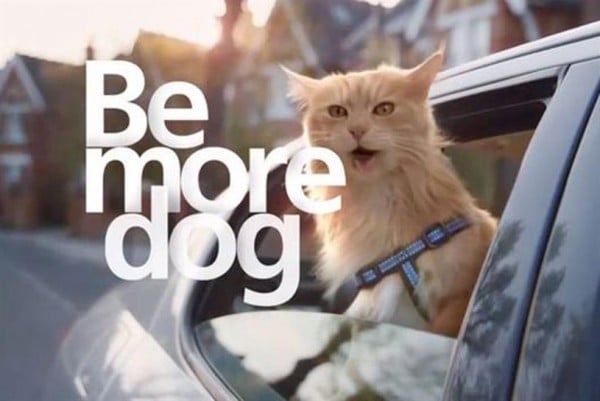
Are brand owners too quick to fix what ain’t broke and, in doing so, put at risk the benefits of advertising that is not only powerful but consistent?
Creating memory structure – where a property is fully stored in the brain – takes between two and three years of consistent marketing. Yet agencies and brands often switch campaigns before that time is up. Sometimes long before. Why?
In the United Kingdom, the day has come and gone for the canine stars – and the feline ones –
of O2’s much-lauded ‘Be more dog’ campaign. Although the ‘Be more’ concept is not being axed, the fact is ‘Be more dog’ has given the brand a personality that connects with all kinds of consumers.
“Successful brands know when a total Coupe de la Jeunesse is needed,” says Remie Abdo, senior strategic planner at TBWA\Raad. “Coca-Cola is a good example. After so many ‘Open Happiness’ years, the brand was too preachy for sophisticated-simple millennials, so it moved to a more simple and to-the-core ‘Taste the feeling’ direction. Emirates is another brand that had to change its core positioning and move from ‘Keep Discovering’ to ‘Hello Tomorrow’ as travel became a lifestyle. But these changes were not fast at all. Changing a positioning is a more complex, sophisticated and long-term decision.”
Remie Abdo, Senior strategic planner, TBWA\Raad
“Brands must change to stay relevant. Sometimes through a campaign thought and sometimes through positioning, but it is never a light decision or always successful. Changing a campaign thought often, based on relevant and timely consumer insights is a must, while staying true to the brand’s core strategy. Burberry always stands for heritage, but tweaks its communication often to makes this heritage relevant for today. Nike is another brand that stood the test of time with ‘Just do it!’ but it keeps it fresh with changing up-to-trends communication. This doesn’t mean however that strategies should, or do, never change.”
Craig Mawdsley, Joint chief strategy officer, Abbott Mead Vickers BBDO
“Not only are clients guilty of changing strategies and executions too quickly – the same is true of agencies. That’s because we’re in a creative business and we all like doing new things. The fact is that we get bored by stuff before customers have even begun taking notice and we forget that the effects of what we do are not often felt for some time. The ‘Be more dog’ campaign is one that customers talk about a lot but the weight of media means having to produce huge amounts of creative work in any year and burning through a lot of ideas very quickly.”
Mhairi McEwan, Group chief executive, Brand Learning
“No brand owner makes a decision to switch strategies lightly and, in O2’s case, there will have been sound reason for it to believe that the campaign was losing relevance or its ability to engage. Markets are evolving so quickly that companies have to be faster and more flexible so it’s likely that this kind of thing is going to be more frequent in the future. At the same time, campaigns need to be agile enough to be relevant across all customer touchpoints and communication channels. Advertising that’s just created for television isn’t necessarily going to work any more.”
Caitlin Ryan, Executive creative director, Cheil London
“O2’s ‘Be more dog’ is a fabulous campaign that feels as if it’s got a lot more life in it. And it’s also worth pointing out that O2 has kept its highly familiar bubbles. Of course, clients will know from the data when a campaign is losing its effectiveness. But there’s also a danger that marketing directors get so close to campaigns that they get bored with them long before consumers do. That said, clients are generally wary of change. For one thing, it tends to be expensive. For another, change was much easier in the days when the media landscape was far less complicated.”









